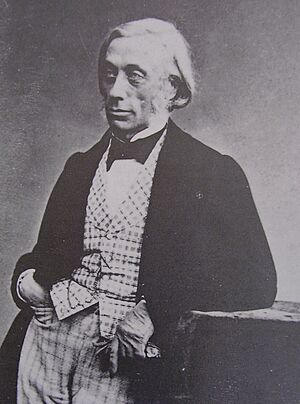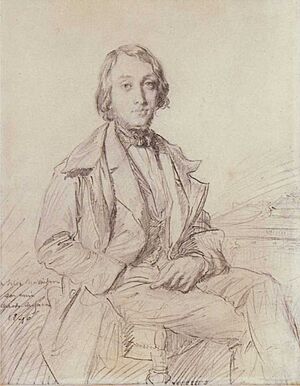Félix Ravaisson-Mollien facts for kids
Quick facts for kids
Felix Ravaisson-Mollien
|
|
|---|---|
 |
|
| Born | 23 October 1813 |
| Died | 18 May 1900 (aged 86) |
| Education | Collège Rollin |
| Alma mater | University of Munich |
| Era | 19th-century philosophy |
| Region | Western philosophy |
| School | Continental philosophy French spiritualism |
| Institutions | University of Rennes |
|
Main interests
|
Metaphysics Positive philosophy |
|
Notable ideas
|
Criticism of French eclecticism |
|
Influences
|
|
|
Influenced
|
|
Jean-Gaspard-Félix Laché Ravaisson-Mollien (born October 23, 1813 – died May 18, 1900) was an important French philosopher. He is often known simply as Félix Ravaisson. Many people consider him one of France's most influential thinkers in the late 1800s.
His most famous book was De l’habitude (1838), which means Of Habit. Ravaisson's ideas were part of a philosophical movement called French Spiritualism. This movement explored how our minds and spirits work. He developed his own unique ideas, calling them 'spiritualist realism' and 'spiritualist positivism'. Some scholars even say he started a new way of thinking called 'the school of contingency'.
Ravaisson didn't work in universities for long. Instead, he held important government jobs. He was an inspector of libraries and later a curator of ancient art at the Louvre Museum. He was also a talented painter, showing his art under the name Laché.
Biography
Félix Ravaisson was born in Namur, a city that was part of France at the time. He studied very well at the Collège Rollin. In 1839, he went to the University of Munich in Germany. There, he listened to lectures by the famous philosopher Schelling. Ravaisson earned his degree in philosophy in 1836.
In 1837, he published the first part of his important book, Essai sur la métaphysique d'Aristote. This means "Essay on the Metaphysics of Aristotle". He added a second part in 1846. In this work, he looked at the ideas of Aristotle and developed his own modern philosophy from them.
In 1838, Ravaisson earned his doctorate degree. His main paper was called "De l'habitude" ("On Habit"). This paper became a very important text in philosophy. It explored the idea of habit and how it shapes us. Later, he became a professor of philosophy at the University of Rennes.
From 1840, he worked as an inspector for public libraries. In 1860, he became an inspector for higher education. He was also a member of the Academy of Moral and Political Sciences. From 1870, he was in charge of the ancient art collection at the Louvre Museum. Félix Ravaisson passed away in Paris in 1900.
Philosophical Work
Ravaisson was part of the philosophical group led by Victor Cousin. However, Ravaisson had his own unique ideas. He believed that our consciousness (our awareness of ourselves and the world) is the basis of all knowledge. He thought that acts of consciousness come from our will (our ability to choose and act). For him, the will is the driving force behind our thoughts and actions.
He also believed that the idea of God comes from all the different parts of our mind. We get this idea by observing the harmony and order in nature and in people. This way of thinking greatly influenced philosophy in France during the late 1800s. His work De l'habitude explored how habits are not just simple actions, but deep parts of our being. He saw habits as a way to understand how nature itself works.
See also
 In Spanish: Félix Ravaisson para niños
In Spanish: Félix Ravaisson para niños


